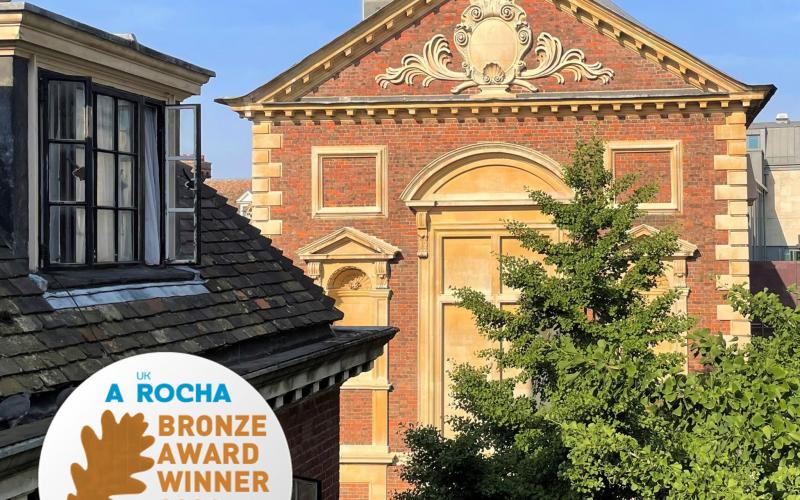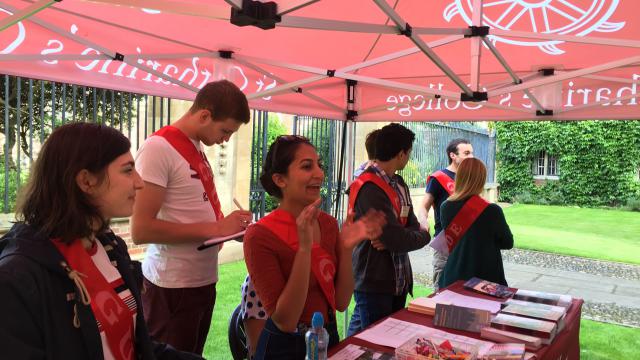This page offers a selection of resources for nurturing spiritual life and for exploring the relationship between faith life, especially in the light of some of the major themes in the contemporary world. You are welcome to use these resources whether or not you would consider yourself religious. If you have suggestions for other resources that would enhance this page, please do let me know.
You are also welcome to come to me for a conversation about anything to do with spiritual wellbeing, as well as general wellbeing - as part of the health and wellbeing team I'm here to support all students, staff and Fellows, of any faith or none.
Rev'd Ally Barrett (Chaplain & Dean of Chapel)
Living Faithfully
You may find it helpful to download the Faith in Cambridge document, which is a collection of information about living faithfully and finding a faith community in Cambridge as a student. It has been prepared by a small group from amongst the Deans and Chaplains, with advice from others, and suggestions for improvement are welcome.
See also the Supporting all faiths page
Catz Multifaith Prayer Room
St Catharine's has a new multifaith prayer room, which is available to all members of the College community, of any faith or none, and their accompanied guests. It is located on the second floor of the central College building that also houses the Chapel and the Dining Hall, and is accessible via the main stairs or lift. Students should have automatic access (via your camcard) to the corridor on which the room is located (if your card doesn't let you in, do ask the porters to add access for you), and to the prayer room itself. Staff and Fellows will need to ask the porters for access to be added to your card.
More about how to access and use the Multifaith Prayer Room.
Chaplaincy Events
There are occasional social / discussion events throughout the year, most of which are intended to be suitable for those of any faith tradition, and are an opportunity to get to know one another, and to get to know more about one another's traditions and learn from one another's experiences.
Duck Walks
Duck walks take place most Fridays during term time, and occasional other days - dates are listed in the Chaplain's weekly email, and below. All are welcome!
The Chaplain provides appropriate duck food (peas and sweetcorn). Duck walks a great for wellbeing, providing an opportunity for fresh air, natural light, a little bit of exercise, and keeping in touch with nature, as well as an hour's break from your work!
Duck walks usually take place on Fridays during term time, meeting at 1pm at the porters' lodge
Pebble Painting
There is a basket of pebbles in the Chapel, decorated with fun and affirming words and images. The stock of pebbles always needs replenishing, so if you'd like to come along to a pebble painting session and decorate pebbles either for yourself, for a friend, or for the Chapel pebble supply, please feel welcome. Dates are listed on the Chaplain's Weekly email.
Pebble painting usually takes place on Sundays at 2pm in A4.
Climate, Eco-theology and Eco-Church
We are delighted to be an 'Eco-Chapel' - we have received our bronze award as part of the A Rocha Eco-Church Scheme. This is reflected in the worship and preaching in the Chapel, the way that the Chapel and chaplaincy helps resource thinking and reflecting around sustainability, practical decisions about how we use the building and the sorts of activities that the Chapel promotes in the College and beyond.
- The small Chapel Library (in the antechapel) includes several borrowable books on theology and environmental matters. If there are books you think it would be good to add to this library, let me know. There is also a wonderful list of recommended ecotheology books (compiled by Hannah Malcolm).
- The antechapel leaflet rack also provides some printed materials (prayers, reflective resources, information) that you are welcome to take away.
- If you are interested in the relationship between the Christian faith and caring for the earth, you may like to read some of the articles from the John Ray Initiative or A Rocha, or Green Christian.
- If you are interested in the relationship between Islam and sustainability, check out the MCB Sustainability and Climate Change project.
- Many other faiths also have their own sustainability projects and resources, and take part in interfaith ecology work - if you'd like to find out more within your own tradition, I would be happy to help you find some contacts and organisations.
- Get involved in the Chapel's application for a silver Eco Chapel (email chaplain@caths.cam.ac.uk for more information)
Identity, equality, diversity and inclusion
- Psalm 139 Retold (originally uploaded here for Transgender awareness week and day of Remembrance, but worth reading at any time)
This reflection is based on one of the Psalms, which is a sacred text for both Jews and Christians. - Inclusive Church is a network of churches, groups and individuals uniting together around a shared vision of a church which celebrates and affirms every person and does not discriminate. The website provides affirming and thought provoking resources, and also lists member churches for each local area.
- The Chapel library also includes several books on matters of identity, equality, diversity and inclusion, which you are welcome to borrow.
Grief and bereavement
When someone dies, we may find ourselves thinking more about what life means, and about 'ultimate questions', including what happens when we die. During the pandemic many people in the College community will have suffered bereavement directly, and all of us have been confronted by the reality of our mortality, as well as processing other losses (loss of certainty, security, confidence, social relationships, and more). If you are dealing with any of these losses and would like some support, or if you find yourself wrestling with ultimate questions and are not sure how to handle them, you are welcome to contact me or any member of the Health and Wellbeing Team - we are here for you, and can also signpost you to specialist support. You may also find that the death of a public figure reignites your own grief, so periods of public or national mourning can be especially hard for those also processing their own private grief.
Whether or not you consider yourself to have a religious faith, you may wish to 'light a virtual candle' as a way of setting aside time to think or pray or take comfort in joining others in a simple act of acknowledging grief. You can do so here. The College also holds an annual service around All Souls (the end of October or beginning of November) at which we read the names of those who have died during the previous year from within the College community (including our alumni) - there is always an opportunity to add the name of a departed loved one to the list, and everyone is welcome to come to the service to light a candle in their memory.
Faraday Institute Events (science and religion)
The Faraday Institute runs regular events and seminars on the relationship between science and religion, many of which are free. Their website also offers a range of really great video resources.
Practical activities
- Decorate a pebble - pick up a pebble from the ground, and decorate it with acrylic paint, or even just pens - use images that remind you of your self worth, your value as a human being, and keep it on your desk as a reminder, or put it in your pocket so the weight and shape of it is always with you. You could also make one for a friend. You can come along to pebble painting sessions (all materials provided) at 2pm on Sundays during term time.
- Go for a walk - there are some walking routes, of varying lengths, on the welfare hub, with maps and photos if you'd like to do them on your own. You can make a walk into something spiritual by taking time to breathe, pay attention to the wonder of creation around you, pause and ask a blessing on the people you pass, and reflect on your own spiritual journey as you undertake a physical journey. Once conditions allow, the Chaplain will advertise the termly 'Long Walk' to Ely (20 miles, and you'll need decent boots, but it is flat!), which ends with the option to go into the Cathedral and let Evensong wash over you. This article explores the idea of turning a walk into a pilgrimage (which needn't be tied to a particular religion), and introduces some tradition pilgrimage routes that you might want to put on your 'wish list' for after the pandemic.
- Get your hands dirty - get some pot plants or plant some seeds, and nurture them - you can pick up a pot plant from A4 any time. You can also join the College gardening club, which has its own allotment. Getting mud on your hands, and having the satisfaction of growing things you can eat, is wonderful for physical and spiritual wellbeing.
- Love your food - consider developing a practice of being thankful for food - think about who made it, where the ingredients may have come from, and who served it to you, and before you eat, send up a thought or prayer of thanks for all that sustains us. And if you'd like to send a thank you card to our amazing kitchen staff every so often, that would make their day :-)
- Go green - some people experience the need to be more sustainable as a spiritual matter as well as a moral and practical imperative. There are loads of ways to get involved in sustainability work at Catz, and I'm always very happy to talk green with anyone who shows any interest in this!
Praying in the Christian tradition
- Daily Prayer from the Church of England - this page offers links to a set of short services, updated daily, that you can use alone or with a friend. There is also an app that you can download on your phone that includes a podcast version of this service, updated every day (morning and evening).
Resources from other faith traditions
If you would like to suggest a favourite prayer, prayerful practice, or spiritual resource from your own tradition that you think others might find helpful, please contact me. Meanwhile, to find out more about various faith traditions, including prayer and spirituality, or to find a place of worship in your own tradition, download the guide to Faith in Cambridge, or contact me for more suggestions. When we know more about one another's traditions we can better support one another in living faithfully, especially in challenging times.







